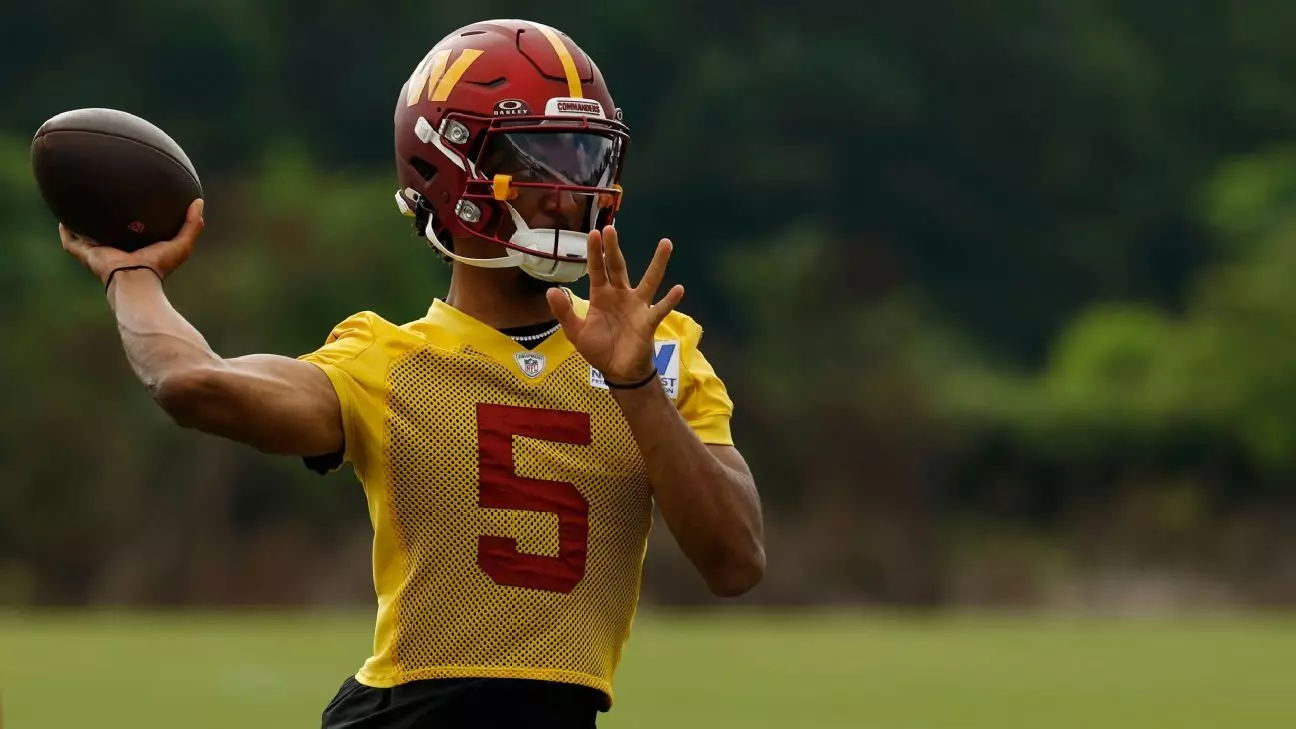In the world of professional football, the leap from rookie to seasoned veteran is often underestimated. Jetting through the initial stages of NFL adaptation, players typically grapple with the complexities of offensive schemes, the speed of the game, and the demands of leadership. Jayden Daniels exemplifies this transformative journey. His recent candid reflection on his progress offers more than just personal growth; it illuminates the critical role confidence and familiarity play in elevating a player’s performance and influence on the team. What stands out is not merely his statistical improvement but his evolving mindset—shifting from a learner to a leader who actively shapes team culture.
Compared to his rookie season, Daniels now approaches the game with heightened self-awareness and assertiveness. He articulates a clear understanding of Kliff Kingsbury’s offensive philosophy, enabling him to access a broader array of tactical tools during games. This mental shift has profound implications: it signifies that mastery of the system translates directly into on-field authority. More importantly, it alleviates the gnawing doubt that often hampers young quarterbacks, allowing him to process plays more swiftly and confidently—attributes that are essential to leadership.
This evolution defies the common narrative that young players are passive learners at this stage of their careers. Daniels’ newfound ability to confront mistakes head-on—such as chastising teammates for errors—demonstrates an internalization of responsibility. His growth underscores a vital truth in sports psychology: mastery breeds confidence, which in turn fosters leadership. When a quarterback begins to call out mistakes without hesitation, it signals a shift from vulnerability to empowerment—a transformation that positively influences the entire team dynamic.
Leadership as a Natural Progression
Team leaders are often perceived as vocal and authoritative figures; however, true leadership manifests subtly and often begins with steadfast accountability. Daniels’ example illustrates how developing comfort in one’s role naturally spills over into leadership qualities. Veteran players and coaches like Austin Ekeler and Dan Quinn acknowledge this progression, highlighting how familiarity with the system enhances decision-making and reduces hesitation. Ekeler’s account of Daniels pulling a teammate out of the huddle for a false start is emblematic of authentic leadership—setting standards and enforcing discipline without hesitation.
What makes Daniels’ growth remarkable is that he recognizes leadership as part of his responsibilities rather than a burden. This shift is crucial, as it indicates a maturation process where the quarterback’s role extends beyond executing plays to elevating team performance through attitude and accountability. In essence, confidence produces clarity—a clarity that empowers a player to lead by example. Daniels’ assertion that “I’m the one that has to uphold the standard” encapsulates the mindset of a player who understands that leadership starts with personal discipline and ends with inspiring others to follow suit.
This emerging leader’s journey defies the typical trajectory of NFL players, especially at the quarterback position. Instead of waiting passively for recognition, Daniels actively molds his identity—balancing the pressure of expectations with the resolve to improve. His progress challenges the misconception that leadership must be innate; instead, it can be cultivated through experience, self-assurance, and a commitment to excellence.
The Power of Mastery and Confidence
Ultimately, Daniels’ story exemplifies how confidence rooted in mastery can redefine a player’s role within a team. His statement—believing that the game now “feels slower”—captures a marked change in perception. The mental clarity derived from familiarity with the offensive scheme allows him to anticipate and adapt swiftly. Such proficiency transforms him into a decision-maker capable of guiding the offense with precision, even under pressure.
This confidence ripple-effect also influences teammates’ perceptions and behaviors. When a quarterback demonstrates toughness and accountability, it encourages others to elevate their own standards. The incident where Daniels removed a teammate from the huddle serves as a powerful testament to the emerging culture he’s fostering: one of high standards, accountability, and relentless pursuit of excellence. This environment is crucial not only for individual growth but also for creating a resilient, cohesive team.
Daniels’ trajectory suggests that with experience and confidence, young quarterbacks can evolve beyond mere playmakers to become true leaders who shape team culture. His evolution underscores a fundamental truth in sports and beyond: mastery and self-assurance are integral to unlocking greater influence and achieving sustained success. In a league where mental toughness can often be the difference between good and great, Daniels’ journey offers a compelling blueprint for aspiring leaders across all fields.


Leave a Reply